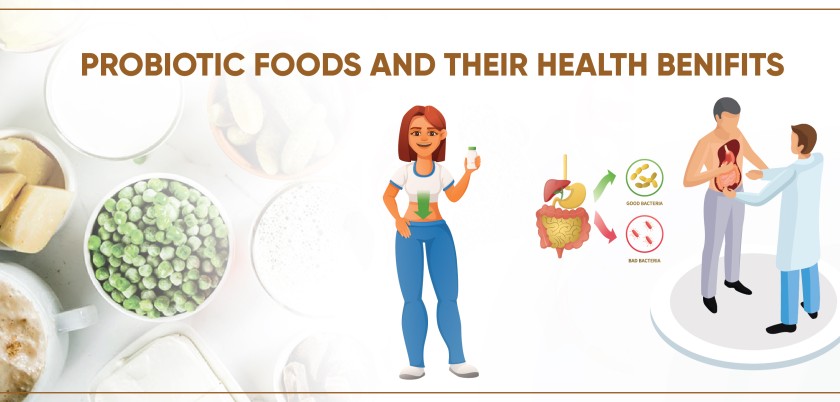
Probiotic food and their health benefits
Our digestive system or 'gut' is the home for millions of healthy microbes which help in maintaining the microbiome balance and killing the disease causing microbes. Probiotics are the live microbes, including bacteria of the family Bifidobacteria and Lactobacillus and/or yeast belonging to the family Saccharomyces. Sources of these probiotics are yoghurt, fermented foods and dietary supplements. These probiotics benefit the humans in various ways such as -
- Maintains healthy gut microflora - Imbalance in the gut microflora may be caused by certain medications such as antibiotics, illness and poor diet. Probiotics help in balancing out the microbes of the gut and impart various health benefits.
- Prevents Diarrhoea - Probiotics are effective in the treatment of a wide spectrum of gastrointestinal diseases such as diarrhoea caused by antibiotics, diarrhoea due to bacteria and virus such as rotavirus, Shigella, Salmonella, enterotoxic E. coli, Vibrio cholerae, human immunodeficiency virus (HIV), inflammatory bowel disease, irritable bowel syndrome and lactose intolerance. They also help in preventing travellers' diarrhoea. Type as well as dose taken of probiotic varies and so does its effectiveness in diarrhoea prevention.
- Promotes Healthy mind - Healthy gut means good mood and mental health. Supplements of probiotics are useful in various mental health disorders such as anxiety, depression, autism, stress, Alzheimer's, obsessive compulsive disorder (OCD) and memory. Studies suggest that probiotic consumption helps in stress management, decision making and cognitive performance.
- Boosts Immunity boosts- Probiotic foods activate various immune mechanisms and have significant role in the functioning of immune system.
- Prevents Covid - 19 - There is a lower likelihood of getting infected with coronavirus if you take probiotics as dietary sources or supplements.
Five probiotic sources easily available and cooked are -
- Curd - Add souring agents like lemon to the warm milk after stirring it and have probiotic rich curd, which is delicious as well as gut friendly.
- Paneer - Like curd, it is also made by fermented milk and can be added to diet as salads, soups, sandwiches etc.
- Buttermilk - Traditional buttermilk, made by fermenting dairy products, also gives a load of healthy bacteria to our gut.
- Idli and dosa - This dish is prepared by fermenting rice and lentils for a period of time, due to which healthy bacteria are formed in them.
- Pickles - Commonly found in every kitchen household, pickles are made by fermenting the vegetables and fruits with oil, spices and salt such as mango, carrot, turnip, cauliflower, chilli, garlic etc.
Other sources include tangy kefir, akhuni (fermented soyabean), miso (fermented soyabean paste), kimchi (fermented carrots, radishes, scallions). Interestingly green peas are itself a probiotic as they contain Leuconostoc mesenteroides.
Probiotics are the friendly bacteria that boost the gut microbiome's health. They are readily available in diets or can be consumed as supplements to reap their health benefits.






